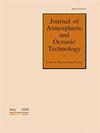A mapping methodology adapted to all polar and subpolar oceans with a stretching/shrinking constraint
IF 1.9
4区 地球科学
Q2 ENGINEERING, OCEAN
引用次数: 0
Abstract
Polar and subpolar oceans play a particularly important role in the global climate and its temporal changes, yet these regions are less well sampled than the rest of the global ocean. To better understand the physical or biogeochemical properties and their variabilities in these regions, accurate data mapping is crucial. In this paper, we introduce a mapping methodology that includes a water column shrinking and stretching constraint (SSC) based on the principle of conservation of potential vorticity. To demonstrate the mapping scheme efficiency, we map the ocean temperature in the southern Sea of Okhotsk, where the bottom topography comprises a broad and shallow shelf, a sharp continental slope, and a deep oceanic basin. Such topographic features are typical of polar and subpolar marginal seas. Results reveal that the SSC integrated (SSCI) mapping strongly reduces the mapping error in the broad and shallow shelf compared with a recently introduced topographic constraint integrated (TCI) mapping procedure. We also tested our mapping scheme in the Southern Ocean, which has a comparatively slanted shelf, a wider and gentler slope, and a deep and broad oceanic basin. We found that the SSCI and TCI methods are practically equivalent there. The SSCI mapping is thus an effective method to map the ocean’s properties in various topographic environments and should be adequate in all polar and subpolar regions. Importantly, we introduced a standardized procedure for determining the decorrelation length scales—a necessary step prior to implementing any mapping scheme—in any topographic conditions.一种适用于所有极地和副极地海洋的测绘方法,具有拉伸/收缩约束
极地和副极地海洋在全球气候及其时间变化中发挥着特别重要的作用,但这些区域的采样情况不如全球海洋的其他区域。为了更好地了解这些地区的物理或生物地球化学特性及其变化性,准确的数据测绘至关重要。在本文中,我们介绍了一种基于位涡守恒原理的映射方法,该方法包括水柱收缩和拉伸约束(SSC)。为了证明绘图方案的有效性,我们绘制了鄂霍次克海南部的海洋温度图,那里的底部地形包括宽阔而浅的陆架、陡峭的大陆坡和深洋盆。这种地形特征是极地和副极地边缘海的典型特征。结果表明,与最近引入的地形约束综合成图程序相比,SSC综合成图大大降低了宽陆架和浅陆架的成图误差。我们还在南大洋测试了我们的测绘方案,南大洋有一个相对倾斜的大陆架、一个更宽更平缓的斜坡和一个又深又宽的洋盆。我们发现SSCI和TCI方法在那里实际上是等效的。因此,SSCI绘图是绘制各种地形环境中海洋特性的有效方法,在所有极地和亚极地都应该足够。重要的是,我们引入了一种标准化程序,用于在任何地形条件下确定去相关长度尺度——这是实施任何测绘方案之前的必要步骤。
本文章由计算机程序翻译,如有差异,请以英文原文为准。
求助全文
约1分钟内获得全文
求助全文
来源期刊
CiteScore
4.50
自引率
9.10%
发文量
135
审稿时长
3 months
期刊介绍:
The Journal of Atmospheric and Oceanic Technology (JTECH) publishes research describing instrumentation and methods used in atmospheric and oceanic research, including remote sensing instruments; measurements, validation, and data analysis techniques from satellites, aircraft, balloons, and surface-based platforms; in situ instruments, measurements, and methods for data acquisition, analysis, and interpretation and assimilation in numerical models; and information systems and algorithms.

 求助内容:
求助内容: 应助结果提醒方式:
应助结果提醒方式:


